- Home
- Tahereh Mafi
Whichwood Page 14
Whichwood Read online
Page 14
BRACE YOURSELF BEFORE YOU READ ON, I BEG YOU
As I said: They were too late.
It was an admirable effort on their part, charging into the city like they did, but the city was already in chaos when they arrived. Alice, who had been holding Laylee’s hand this whole time, was helping the mordeshoor get stronger in every moment. Laylee’s eyes occasionally flickered open long enough to retain new information about their situation and, fortified anew, she was ready to guide with her eyes when necessary.
Unluckily, there was little to be done.
The mass of happy people they’d seen swarming the streets just hours before was nowhere to be found. Instead, bloodcurdling screams rang out across the city, parents fainting in the streets while their children sobbed helplessly at their sides. Food stalls had been knocked sideways; lanterns had been shattered on sidewalks; cocktails of blood and pomegranate juice dripped down snowy banks and streets, scarlet tendrils snaking across the land.
Of the forty spirits unleashed upon the city, just under half of them had already unzipped humans from their flesh. That left twenty-two of them wandering about the city, still haunting the remaining humans, taking their time choosing which skin they liked best.
This created two very awful scenes in the street.
First, and perhaps most disturbing: The humans whose skins had been harvested were still alive. They stumbled around, muscle and bone exposed to the elements, bleeding uncontrollably and retching at intervals. They could survive in this condition for no more than an hour, during which time the ghosts who’d stolen their skins were afforded the opportunity to return the skin to its owner. If not, the bloody remains would simply collapse. We could not know exactly how long it had been since their skins were stolen, but it had been at least some many minutes, and time was running out. Worse still: It was horrifying to witness. Eighteen skinless bodies staggered in the ice and snow, slipping repeatedly in pools of their own blood and bile, while their children looked on in horror. Thus far, only adult bodies had been chosen for harvest, as their skins were most roomy.
Which brings us to the second set of awful scenes in the street: The ghosts, who’d eagerly and clumsily pulled on their fresh human flesh, could not understand why they weren’t immediately accepted by the rest of the living society. They stumbled around, untroubled and excited to join the others in the night’s festivities, and were made only angrier by the full and thorough rejections they received. They finally looked like the others, didn’t they? They looked like they used to, didn’t they?
The trouble was, the spirits had no access to a mirror; if they had, they might’ve noticed that the skins they’d stretched over their spirits were bunched up in all the wrong places—and too tight in others. It had been a long time since they’d been human, you see, and they couldn’t remember where everything was supposed to go. Their noses were on their foreheads and their lips were where the nose should be; fingers were only half filled, and elbows had gone where shoulders should; one ghost had put his leg into an arm, and another had zipped the whole thing on backward, and—anyway, suffice it to say that they were not as attractive as they’d hoped to be.
So there it was: The beautiful, incomparable streets of Whichwood had gone slippery with the blood of the still-living, who staggered sideways and frontways, scarlet icicles forming along their beating hearts as fresh blood dripped down their vulnerable bodies.
Seeing all this, Benyamin’s mother fell to her knees.
She was a strong woman with an iron will, but this was too much even for her to stand. Her legs, already weak from the effort to get her here, could no longer keep her steady, and so she sank to the ground, her mouth unhinged in shock, as the dead skins taunted the stumbling remains, and the whole of Whichwood lost their minds in horror.
Still, there was work to be done.
The children were unusually composed in the face of unspeakable terrors. For Alice and Oliver and Benyamin, the situation felt somehow surreal, intangible, and dreamlike, but for Laylee—well, for Laylee, it was just another day at work.
The mordeshoor, who’d been invigorated enough to speak clearly, asked Alice to unhook the whip hung from her trusty tool belt. Alice quickly complied and, with Laylee’s careful permission and instruction, cracked the whip through the air three times.
The spirits—far and wide—stood still.
Alice cracked it thrice more. The vagabond spirits, still susceptible to the methods of the mordeshoor, screamed out in surprise. Once she knew she had their attention, Laylee spoke quietly. Her words were for the spirits alone, and she knew they would hear her.
“Come here,” she said softly. “I’d like to speak with you.” And she instructed Alice to crack the whip until the ghosts came.
Benyamin, meanwhile, had formed a plan of his own. With enough time, perhaps Laylee could convince the ghosts to give up their human skins, but right now they needed a temporary solution for these quickly deteriorating bodies, and fast. Benyamin spoke quietly and urgently with his creatures, and though no one could’ve known for sure that Benyamin’s plan would work, the insects quickly agreed to help. But this was the kind of plan that would require the assistance of nearly all the many-legged residents of Whichwood, not merely the ones who were loyal to Benyamin. Haftpa set off with his troops at once, promising Benyamin that they would return with as many recruits as possible.
While Haftpa scuttled off in search of more compatriots, Laylee’s twenty-two remaining ghosts had begun to gather. It took longer than Laylee would have liked for them to show their faces, but then—well, they were a bit mortified to have been found out like this. The ghosts still felt they’d done right to avenge their mordeshoor, but somehow they knew she wouldn’t approve of their methods, and they couldn’t bear to face her. Fortunately, they didn’t have a choice in the matter. There was a definitive kind of magic that tied the ghosts to her, and they could not disobey her call so long as she was alive. And so they floated cowardly forward until they stood before her, transparent heads hung in shame.
No one but Laylee could see what was happening, but that didn’t matter. Her friends stood by apprehensively, ready to step in should she call upon them.
“Do you see now?” Laylee said to her dead. “Do you see what it would be like to stay behind?” She lifted one weak arm to point at the bumbling skins inhabited by the ghosts pretending to be human, their lopsided arms and noses sending passersby screaming into the night. “They are reviled. They leave in their wake nothing but blood and madness. You,” she said to the still-gauzy spirits, “in an unfamiliar flesh, would not be accepted back into your families. You would not be invited back to society. Your time here has come to an end, friends. You have to trust in the hourglass of the worlds,” she said. “You must move on when it’s time to go.”
“But you abandoned us!” cried one of the ghosts. “You left us behind—”
“Never,” said Laylee. “I would never. I fell ill only because I tried too hard. But I would never abandon you to this fate,” she said, nodding again to the devastating scene before them. “You are my charges in this world, and it is my duty to protect you.
“Please,” she said softly. “Let me help you move on.”
Haftpa had returned.
The city could hear them approach before they saw their small, creeping bodies, thousands upon thousands of hard-shelled creatures charging into the center of town. Benyamin’s plan was for the insects to form protective armor around the skinless humans just long enough for Laylee to convince the eighteen ghosts to give said skins back to their human owners. Haftpa scurried forward as quickly as he could, climbed atop Benyamin’s shoulder, and receiving the signal from his human-friend, he lifted one leg to unleash his comrades upon the night.
Tragically, they were already too late.
Just as the insects charged forward, four of the skinless bodies collapsed, unmoving, to th
e ground. The impossible moment was so saturated with madness that there was no time to stop—no time for Laylee to lose her head—no time at all to pause and mourn the four innocent lives they’d been too slow to save. What could she do? How would she answer for this? Laylee’s head was spinning. It was simply unacceptable that anyone had died; improbable that she was not dreaming.
Had she dreamed it?
The sounds of the world seemed to surge back into her consciousness. Suddenly she heard a rushing stream of clicking legs thrusting into the darkness, parting people and places, climbing over upturned wares and shattered lanterns. The mass of bugs poured all at once into the center square where the remaining bloody, skinless human figures were still staggering and, in a moment of horrible necessity, climbed atop the soggy masses of flesh until the still-alive fourteen bleeding human bodies were swallowed up by a sea of sharp black exoskeletons. The thousands of insects moved in choreographed perfection, linking arms and legs in a synchronized procession, clicking into place to create temporary armor. The entire act took no longer than several minutes, but the world seemed to slow in that time, strangers looking on with a combination of awe and revulsion as the entomological world came together to spare these human lives.
The armor would afford them at least a few more hours of protection, and in that time, Laylee and her troop would have to move quickly. Instinct alone was keeping Laylee afloat. She didn’t know if anyone else had noticed yet, or if any of her friends had seen what had happened. Alice and Benyamin rushed forward to usher the now-armored bodies away from the awkwardly skinned ghosts; Laylee still needed time to negotiate with the ghostly thieves who’d stolen the human skins, but at least until then the human bodies, now protected from the elements, were able to move with ease and quickly ceased their retching.
Laylee, who was still negotiating with her spirits, was making requests from her wheelbarrow, and Oliver, her newly appointed assistant, was only too happy to oblige. They would have to get everyone back to the castle as soon as possible, and they would need as many volunteers as they could get. They would have to wash forty-four corpses tonight (including the four newly dead bodies), or many more innocent people would die before morning.
Benyamin’s mother took it upon herself to gather the volunteers. She promised to go door-to-door, collecting as many helping hands as possible, and would meet them back at the castle. But she urged them not to wait for her.
“Go,” she said. “You take the train—it’ll be arriving any moment now—and I will meet you at the castle. We’ll take transport by water.”
So they split up.
Alice, Benyamin, Laylee, and Oliver herded up the ghosts, the armored humans, and the skinned spirits (who went with great reluctance, still unconvinced they should give up their freshly acquired flesh), and rushed for the abandoned station, where the glimmering carriages were just pulling in.
This time, they did not stop to get tickets.
Alice and Benyamin shoved the lot of them into as many carriages as necessary before hauling Laylee, her barrow, and Oliver into another carriage. Once certain that Laylee was in control and still in communication with her drifting spirits, Alice and Benyamin hopped inside, squeezing themselves into the tight space, determined to stick together this time, no matter the discomfort.
Alice, as usual, wasted no time.
Laylee was feeling better than ever, but Alice was determined to heal her until she was completely cured, and with an hour and a half to go until they reached the castle, there was still a great deal to be done. Benyamin and Oliver lifted Laylee out of the barrow to lay her down on the bench seat, and Alice set to work. In no time at all, she was, again, making visible progress. Alice had already returned Laylee’s arms and legs back to normal, but now she was working on Laylee’s face. In the last several hours, her skin had gone from a warm, golden brown to an ashy, dusty shade of rust, and as Alice pressed her fingers to the mordeshoor’s skin, one gentle movement at a time, Laylee slowly came back to life. Her eyes were closed, but Alice could see the rapid movement behind her eyelids, and only after she was satisfied with the color coming back into Laylee’s cheeks did Alice finally remove her hands for a quick rest. It was tiring work, after all, and Alice was out of breath with exhaustion—and exhilaration. It was gratifying to see her hard work pay off, and it was even more gratifying when Laylee flickered open her eyes, and her friends finally saw her real eye color.
Gone was the cold silver gaze of the mordeshoor Alice and Oliver had only known, and in its stead were the warm amber eyes of a girl who, for the first time in over a year, was able to see clearly. Laylee, who could not understand exactly what had happened, but could feel the difference, sat straight up and wept. It was an extraordinary change, and a gift she’d not been prepared to receive. She looked at her hands, no longer trembling, and her legs, no longer aching, and she threw herself into Alice’s arms and cried.
By the time they reached the castle, Laylee was standing up. She was grateful for her health, but she couldn’t help but feel a deep pain in her gut for the four lives they’d lost this evening. Alice was sure that Laylee would, in the end, be ready to smile again, but Laylee couldn’t bring herself to be happy yet. There was still too much work to do—and she could only guess at the repercussions she would face for their losses tonight.
So it was with an unsettling grimness that she prepared to wash the last of her remaining dead, and it was with a heaviness in her step that she jumped off the glass carriage and into the train station and ran, strong and skillful, toward home.
(With many strange bodies following closely behind.)
It seemed clear what needed to be done.
Laylee charged directly into the backyard, her small army following, and prepared the tub. The spirits who’d stolen human skins needed a bit more persuasion to give up their new clothes, but after several minutes of show-and-tell on the part of the mordeshoor, they were eventually convinced they’d made a terrible mistake. Good thing, too, as they would have to go first. Laylee quickly separated their fourteen corpses from the large pile in her shed, and got to work.
Friends, it was a very, very long night.
They scrubbed until their fingers bled and their eyelids frosted open. They scrubbed until they couldn’t speak and could barely stand. They scrubbed until Benyamin’s mother showed up, hobbling forward disappointed and exhausted, with no volunteers in tow (none could be persuaded to help, I’m afraid), and still Laylee would not sit. She stood tall, scrubbing bodies until her fingernails broke, and as each body was shipped off to the Otherwhere, the corresponding spirit, duly shamed, stepped out of the human skin they awkwardly wore, and left it lying in the snow. Only then did Benyamin’s insects disembark their human ship, and allow the body to reclaim its flesh. They did this until all fourteen humans were reunited with their skins, and even then, Laylee would not stop.
Alice feared the mordeshoor had been reinvigorated just in time to destroy herself all over again. And though her friends begged her to stop, to slow down, to take a break before she grew ill, Laylee would not hesitate, she would not listen to reason, and she thought that she would rather die than live with the weight of this burden or this grief ever again. So she soldiered ahead, working with her friends—and even occasionally alone—until every single body was scrubbed and sent off into the night.
Only then, dear friends, did Laylee Layla Fenjoon finally fall.
FORGIVE ME, BUT THINGS ONLY GET WORSE
Polygons of light broke through damp branches, tree trunks perspiring in the misty dawn. It was a cold, golden morning, the sun unfurling its rays to touch pinpricks of dew, the rolling hills rumbling under blankets of snow. For a protracted moment, everything was new, untouched; the horrors of the prior evening were temporarily forgotten. It was that impossible time between sleep and consciousness, when fears were still too tired to exist, when responsibilities stood patiently behind a do
or. Laylee was loath to disturb this peace, but she could feel herself stir; she was becoming increasingly aware of sounds and surroundings, and she was now dimly aware of the fact that she’d fallen asleep in the snow. It was odd, then, that she felt warm and heavy—like someone had thought to throw a cloak over her as she slept—and it was only when, finally, reluctantly, she blinked open her eyes that she realized she was not covered in blankets, but in bugs—tens of hundreds of hard-bodied creatures—who had curled up quietly against her skin. Somehow, even in the face of this revolting realization, Laylee couldn’t help but smile. In fact, Alice swears she heard Laylee laugh out loud (she claims it’s the sound that woke her that morning), but Laylee has repeatedly denied this.
Our point here is that Laylee, though conflicted about the mixed outcome of the prior evening’s events, felt the crippling burden of her corpses slough off her body as if she’d shed a full skin. She felt a lightness she hadn’t experienced in years, and as she became aware not only of the day, but of the healthy strength in her limbs, she allowed herself to feel—if only for a moment—happy. The evening had been a horrible one, but at least it was over. They’d saved as many innocent people as they could from an exceptionally dire fate, and sent off all the outstanding spirits to the Otherwhere. But it was with a sinking feeling that she sat up slowly, delicately dislodging insects from her eyebrows. Laylee still felt a kick to her gut when she thought of the four lives they hadn’t saved, and though she’d never be able to applaud her own actions, she did manage to feel proud of her friends for working so hard to help her last night. So when Alice mumbled a smiling good morning in her direction, Laylee felt her face stretch in an entirely new way, cheeks and chin fighting to accommodate a rare grin that brightened her amber eyes. Laylee looked up at the sky, waved her own hello to the winter birds who’d gathered, as usual, for their morning conference, and allowed herself to imagine what on earth she’d do with a day off.

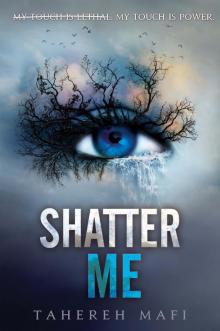 Shatter Me
Shatter Me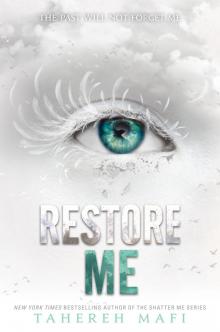 Restore Me
Restore Me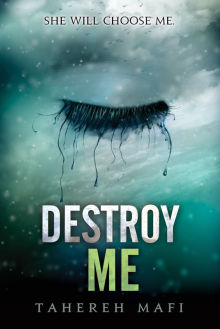 Destroy Me
Destroy Me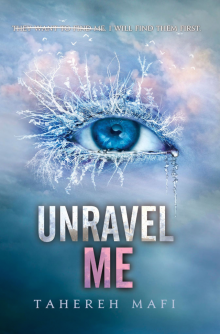 Unravel Me
Unravel Me Ignite Me
Ignite Me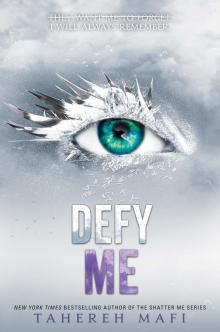 Defy Me
Defy Me Fracture Me
Fracture Me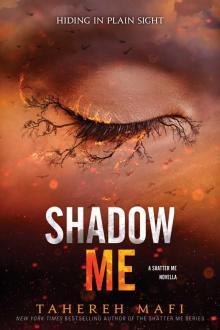 Shadow Me
Shadow Me Whichwood
Whichwood Reveal Me
Reveal Me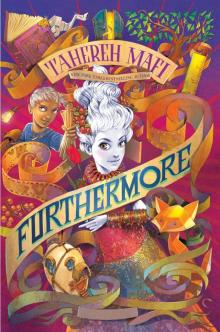 Furthermore
Furthermore Shadow Me (Shatter Me Novella)
Shadow Me (Shatter Me Novella)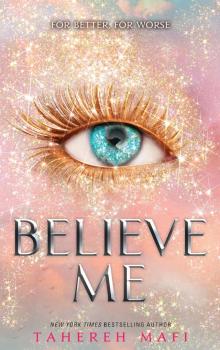 Believe Me
Believe Me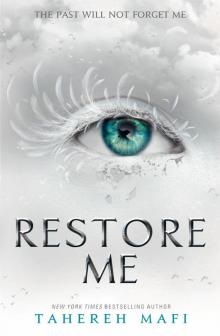 Restore Me (Shatter Me)
Restore Me (Shatter Me)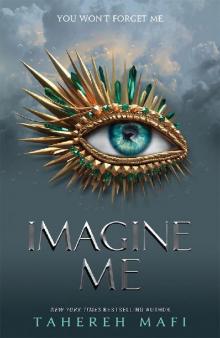 Imagine Me
Imagine Me An Emotion of Great Delight
An Emotion of Great Delight Find Me
Find Me A Very Large Expanse of Sea
A Very Large Expanse of Sea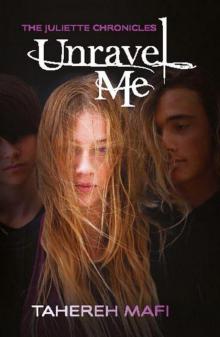 Unravel Me: The Juliette Chronicles Book 2
Unravel Me: The Juliette Chronicles Book 2